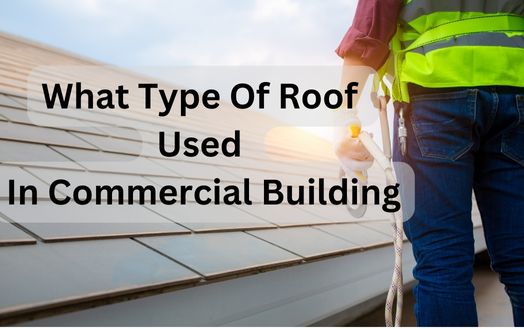
As a commercial building owner or developer, choosing the right type of roof is a crucial decision. A well-designed and properly installed roof not only protects your investment but also enhances the overall functionality and appearance of your commercial property.
In this blog, we will explore what type of roof used in commercial building and discuss their advantages and disadvantages. We will delve into the importance of selecting the right roof for your business, factors to consider when making this decision, and the maintenance requirements of commercial roofs. So, let’s dive in and discover which type of roof best suits your commercial building needs.
When it comes to commercial roofing, there are several types of roofing systems to choose from. Each type offers its own unique set of advantages and disadvantages, making it essential to consider factors such as weather conditions, energy costs, and environmental factors when making your decision. Understanding the different types of commercial roofing will help you make an informed choice that suits your specific needs and requirements. Let us find out from this article what type of roof used in commercial building.
The type of roof you choose for your commercial property can have a significant impact on its energy efficiency, cost savings, and overall curb appeal. A well-chosen commercial roof not only provides protection against environmental factors but also enhances the overall aesthetic appeal of your business.
One of the essential factors to consider when selecting a commercial roof is energy efficiency. An energy-efficient roof helps reduce heating and cooling costs, making your commercial property more eco-friendly and cost-effective. Additionally, energy-efficient roofs can contribute to a more comfortable indoor environment, ensuring the well-being of your employees and customers.
Commercial properties, especially those that rely heavily on air conditioning, can greatly benefit from a roof that effectively reflects sunlight and reduces heat transfer. By choosing the right commercial roof, you can significantly lower energy costs and create a more sustainable business environment.
Curb appeal is another crucial aspect to consider when selecting a commercial roof. A well-designed and visually appealing roof enhances the overall appearance of your building, making it stand out among competitors. Whether it’s an elegant metal roof or a green roof with plants and foliage, the type of roof you choose can make a lasting impression on customers, clients, and business partners.
Additionally, a well-maintained commercial roof adds value to your property, making it an attractive investment. It provides peace of mind, knowing that your roof is capable of withstanding weather conditions and protecting your commercial property for years to come.
Choosing the right commercial roof involves considering various factors that will affect the long-term performance and maintenance of your building. Weather conditions play a crucial role in determining the type of roof that is best suited for your commercial property. Whether you are dealing with heavy rain, strong winds, snow, or extreme temperatures, it’s important to select a roof that can withstand these elements and provide reliable protection.
Another important factor to consider is the choice of roofing materials. There are several options available, including metal roofing, PVC or TPO roof membranes, shingle roofing, and spray-on roofing systems. Each material has its own set of advantages and disadvantages, which must align with the specific needs of your commercial building.
Energy costs are also a significant consideration. An energy-efficient roof can help reduce heating and cooling expenses, ultimately leading to cost savings in the long run. By selecting a commercial roofing system that minimizes energy consumption, you can create a more sustainable and eco-friendly building.
Lastly, it is important to consider the maintenance requirements of the chosen commercial roofing system. Some roofing materials may require regular inspections and maintenance, while others provide low maintenance solutions, reducing the overall cost and effort required to keep your roof in optimal condition.
Considering these key factors will help you make an informed decision when choosing a commercial roof that meets your building’s specific requirements, weather conditions, energy costs, and maintenance preferences.
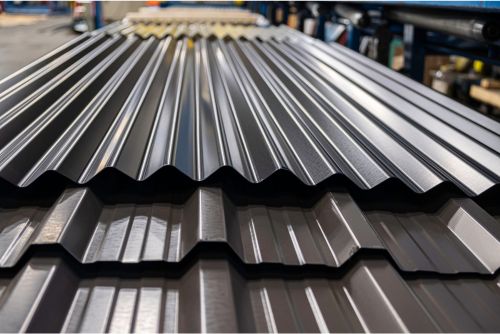
Metal roofing systems are an increasingly popular choice for commercial properties, offering a combination of durability, elegance, and energy efficiency. With their sleek appearance and impressive longevity, metal roofs provide a reliable solution for businesses looking for a low maintenance and long-lasting roofing system.
One of the key benefits of metal roofing systems is their exceptional durability. Metal roofs are designed to withstand high winds, heavy rain, snow, and temperature extremes, making them a suitable choice for commercial properties located in areas prone to harsh weather conditions. Whether it’s stainless steel, aluminum, or copper, metal roofs can provide reliable protection for many years, minimizing the need for frequent commercial roof repairs NJ and replacement.
In addition to their durability, metal roofs offer energy efficiency advantages. They have reflective properties that help reduce heat absorption, resulting in lower cooling costs during the warmer months. This energy efficiency feature contributes to cost savings and creates a more comfortable environment inside commercial buildings, especially those relying heavily on air conditioning.
Another advantage of metal roofing systems is their low maintenance requirements. Unlike certain roofing materials that may require regular inspections, materials, and repairs, metal roofs generally require minimal upkeep. This low maintenance aspect of metal roofs makes them an attractive option for commercial building owners, saving both time and money in the long run.
However, it’s important to consider a few drawbacks of metal roofing systems. While metal roofs are highly resistant to most weather conditions, they can be prone to damage in severe hailstorms or when branches or debris fall on them. Additionally, the initial cost of installing metal roofing systems may be higher compared to other types of roofs, but the long-term cost savings due to their durability and energy efficiency often outweigh the upfront investment.
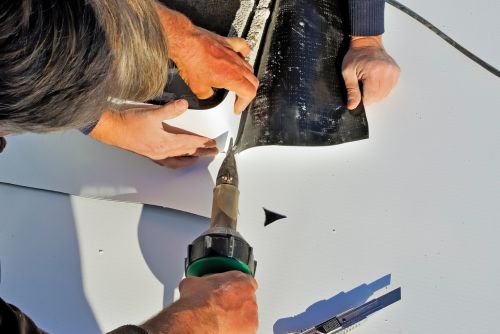
For commercial properties with flat roofs, PVC (polyvinyl chloride) or TPO (thermoplastic olefin) roof membranes offer versatility, resilience, and energy efficiency. These single-ply roofing membrane systems provide an excellent solution for flat roof applications, delivering reliable protection against weather conditions, environmental factors, and high traffic areas.
PVC roof membranes are made of high-quality synthetic materials, offering exceptional durability and resistance to ultraviolet light, temperature extremes, and chemical exposure. Their flexibility allows for easy installation on flat roofs with intricate designs or unique contours. PVC roof membranes are also known for their low maintenance requirements and energy efficiency, reducing heating and cooling costs for commercial properties with flat roofs.
TPO roof membranes, on the other hand, are a cost-effective option for commercial properties with flat roofs. They combine the benefits of PVC roofing systems, such as energy efficiency and durability, with a more affordable price point. TPO roof membranes provide excellent weather resistance, protection against ultraviolet light, and reliable performance in flat roof applications.
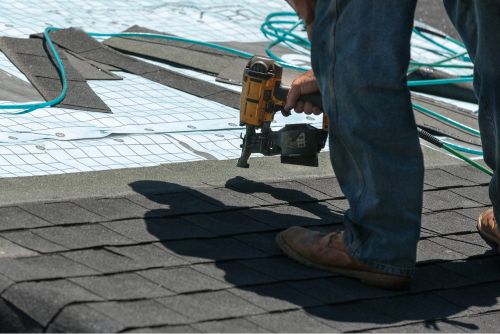
Shingle roofing systems, specifically asphalt shingles, are a popular choice for commercial properties due to their affordability, versatility, and ease of installation. Whether it’s for new construction or roof replacement projects, asphalt shingles offer an attractive, cost-effective roofing solution that suits various commercial roofing applications.
Asphalt shingles are available in a wide range of colors, styles, and designs, allowing commercial building owners to choose a shingle roofing system that complements their building’s aesthetic appeal. Their versatility makes asphalt shingles suitable for different types of commercial buildings, from office complexes to retail spaces.
Additionally, asphalt shingles are relatively easy to install, resulting in reduced labor costs and shorter installation timeframes. This affordability, versatility, and ease of installation make asphalt shingles an attractive choice for commercial properties looking for a reliable and cost-effective roofing solution.
Spray-on roofing systems, also known as SPF (Spray Polyurethane Foam) roofing, offer commercial properties an environmentally friendly and versatile roofing solution. This type of roofing system involves spraying a mixture of polyurethane foam and protective surface layers onto the existing roof, creating a seamless, monolithic membrane that provides excellent insulation, durability, and weather resistance.
SPF roofing systems are an environmentally friendly option as they can be applied directly over existing roofing materials, reducing the need for roof replacement and contributing to waste reduction. The foam material offers superior insulation, reducing heating and cooling costs, and improving energy efficiency for commercial properties. The protective surface layers enhance the roof’s strength, waterproofing capabilities, and resistance to ultraviolet light, weather conditions, and impacts.
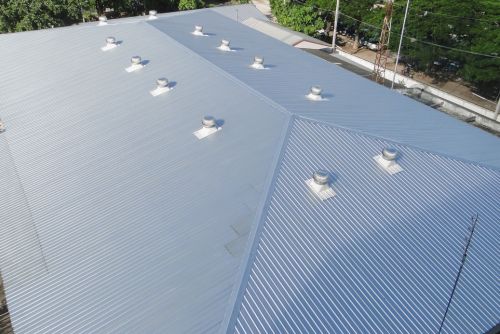
Commercial cool roofing systems offer energy efficiency and cost savings, making them an attractive choice for businesses looking to reduce energy costs and environmental impact. These roofing systems utilize materials and designs that reflect more sunlight and absorb less heat, reducing the amount of heat transferred into commercial buildings. By minimizing heat absorption, commercial cool roofs can significantly lower cooling costs, making them an energy-efficient solution for commercial properties.
Commercial cool roofs are available in various materials, including metal, asphalt, and single-ply membranes. These materials are engineered to have high solar reflectance, reflecting a large portion of the sun’s rays, and high thermal emissivity, allowing them to release absorbed heat efficiently. Both properties contribute to energy cost savings and a more comfortable indoor environment, especially in warm and sunny regions.
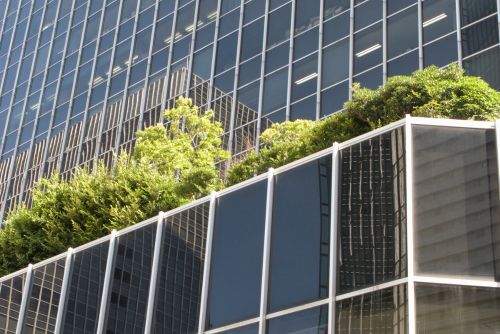
In addition to metal roofs, PVC or TPO roof membranes, shingle roofs, and spray-on roofing systems, there are several other types of roofs used in commercial buildings. These include green roofing, built-up roofing membrane systems, and other flat roof types that offer their own unique set of advantages and considerations.
Green roofing systems, for example, provide environmental benefits, energy efficiency, and aesthetic appeal by incorporating vegetation and plants into the roof structure. Built-up roofing membrane systems, on the other hand, are composed of multiple layers of bitumen, providing durability, weather resistance, and low slope compatibility.
What type of roof used in commercial building? When it comes to selecting the right roof for your commercial building, there are several factors to consider. The specific weather conditions of your region, energy costs, maintenance requirements, and architectural design are crucial considerations in making an informed decision.
It’s important to evaluate the performance characteristics and durability of different roofing materials, the cost savings associated with energy efficiency, and the expertise of roofing contractors in handling specific types of roofs. By considering these factors, you can determine the best roof type for your commercial building, whether it’s a new construction or roof replacement project.
When deciding on the best roof for your commercial building, there are several factors that warrant consideration.
First and foremost, weather conditions play a significant role in determining the ideal roofing material. Consider the climatic conditions of your region, including temperature extremes, rainfall, wind, and snow, to select a roof that can withstand and protect against these elements.
Energy costs are another crucial factor to consider. An energy-efficient roof can significantly lower heating and cooling costs, leading to substantial savings over time. Evaluate the energy efficiency ratings of different roofing materials and comprehend how they align with your commercial building’s energy consumption needs.
Furthermore, staying informed about the roofing industry will help you make a well-informed decision. Research new materials, technologies, and roofing system advancements, and consult industry experts or roofing contractors to gain insights into the best roofing options available.
Ultimately, the best option for your commercial building will depend on factors such as weather conditions, energy costs, maintenance requirements, and your budget. By carefully weighing these factors, you can make an informed decision that ensures long-term durability and cost savings for your commercial roof.
While conducting your own research is a valuable step in determining the right roof for your commercial building, seeking expert advice can provide invaluable insights and guidance. Commercial roofing contractors are experienced professionals who specialize in commercial roofs and can offer expert advice tailored to the unique needs of your building.
Consulting commercial roofing contractors allows you to benefit from their industry knowledge and expertise. They can assess your building, discuss your requirements and preferences, and provide recommendations based on their experience working with various roofing materials and systems.
Additionally, many roofing contractors offer free estimates, which can help you understand the costs associated with different roofing options. These estimates provide valuable information for budgeting and aligning your roofing project with your financial goals.
By engaging with commercial roofing contractors, you can ensure that you have access to professional guidance, accurate cost estimates, and high-quality commercial roofing services. Their expertise and insights will assist you in making an informed decision that meets your commercial building’s roofing requirements.
Regular maintenance and upkeep of your commercial roof are essential for its long-term durability, functionality, and cost savings. By following a proactive maintenance routine, you can identify and address potential issues before they escalate, minimizing the risk of extensive damage and costly repairs.
A well-maintained roofing system improves energy efficiency, extends the lifespan of your roof, and ensures that it continues to offer reliable protection against weather conditions and environmental factors. Engaging the services of a professional roofing contractor for regular inspections, maintenance, and repairs is recommended to maximize the performance of your commercial roof.
Regular maintenance is vital for commercial roofs because it contributes to energy efficiency, low maintenance requirements, and cost-effective roofing solutions.
Proactive maintenance helps optimize energy efficiency by identifying and addressing factors that could compromise a commercial roof’s insulation, ventilation, or reflective properties. By maintaining these energy-efficient features, commercial properties can reduce their environmental footprint and minimize energy costs.
Regular maintenance also ensures low maintenance requirements, as minor issues can be addressed promptly before they escalate into major problems. By conducting routine inspections, commercial building owners can identify potential commercial leak repair NJ, damages, or wear and tear, enabling them to take proactive measures and save significantly on repair costs.
Engaging commercial roofing services for regular maintenance provides commercial building owners with industry expertise, ensuring that their roofs receive the necessary care and attention they require. By relying on professional roofing contractors, commercial building owners can have peace of mind knowing that their roofs are well-maintained, properly repaired, and properly aligned with industry best practices.
To ensure the longevity and functionality of your commercial building, it is essential to choose the right roof type. Each commercial roof type comes with its own set of advantages and limitations. Metal roofing systems offer durability and elegance, while PVC or TPO roof membranes provide versatility and resilience. Shingle roofing systems are known for their affordability and versatility, while spray-on roofing offers environmental friendliness and versatility. Commercial cool roofing offers energy efficiency and cost savings. Additionally, there are other options such as green roofing and built-up roofing membranes. When deciding on the right roof for your commercial building, factors such as climate, budget, and maintenance requirements should be considered. Seeking expert advice can also help in making an informed decision. Regular maintenance and upkeep of commercial roofs is crucial to extend their lifespan. By selecting the appropriate roof type and maintaining it properly, you can ensure the safety and functionality of your commercial building for years to come.